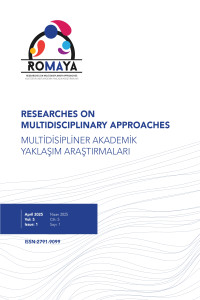Öz
With globalization, countries have begun to prioritize economic and soft power alongside military strength in their security strategies. Following the global shift in power after 1990, the Russian Federation, facing a historical turning point, required reorganization and a new approach to secure its role in the emerging international system. Digital games, a significant aspect of popular culture, play a role in ideological and political meaning-making, reflecting real-life dynamics. Games with narratives can construct ideological worlds, embedding and communicating myths and representations to players. In this context, analyzing the Russian-developed game 35 MM provides insight into Russia’s strategy of using soft power to extend its cultural influence while aintaining
regional interests. This study aims to uncover the cultural codes that reflect Russia’s effort to promote its global presence through digital games without abandoning regionalism. By interpreting 35
MM through a post-Soviet lens, the study explores the underlying symbols and boundaries of this new hegemonic and ideological strategy. The findings reveal that video games have the potential to be powerful tools for countries to disseminate cultural hegemony. Russia is actively leveraging this potential by collaborating with game developers to extend its cultural influence to younger generations.
Anahtar Kelimeler
Kaynakça
- Yengin, D. (2012). Dijital Oyunlarda Şiddet, İstanbul: Beta Publications.
- Yıldırım, A. ve Şimşek, H. (2013). Sosyal bilimlerde nitel araştırma yöntemleri, Ankara: Seçkin Publications.
- Zakaria, F. (2008). The Post-American World. New York: Norton Publications.
- Zahran, G., & Ramos, L. (2010). From hegemony to soft power: implications of a conceptual change. In Soft power and US foreign policy (24-43). Routledge.
Öz
Kaynakça
- Yengin, D. (2012). Dijital Oyunlarda Şiddet, İstanbul: Beta Publications.
- Yıldırım, A. ve Şimşek, H. (2013). Sosyal bilimlerde nitel araştırma yöntemleri, Ankara: Seçkin Publications.
- Zakaria, F. (2008). The Post-American World. New York: Norton Publications.
- Zahran, G., & Ramos, L. (2010). From hegemony to soft power: implications of a conceptual change. In Soft power and US foreign policy (24-43). Routledge.
Ayrıntılar
| Birincil Dil | İngilizce |
|---|---|
| Konular | İletişim ve Medya Politikası |
| Bölüm | 2025 5/1 (April) |
| Yazarlar | |
| Yayımlanma Tarihi | 22 Nisan 2025 |
| Gönderilme Tarihi | 26 Eylül 2024 |
| Kabul Tarihi | 29 Ekim 2024 |
| Yayımlandığı Sayı | Yıl 2025 Cilt: 5 Sayı: 1 |


